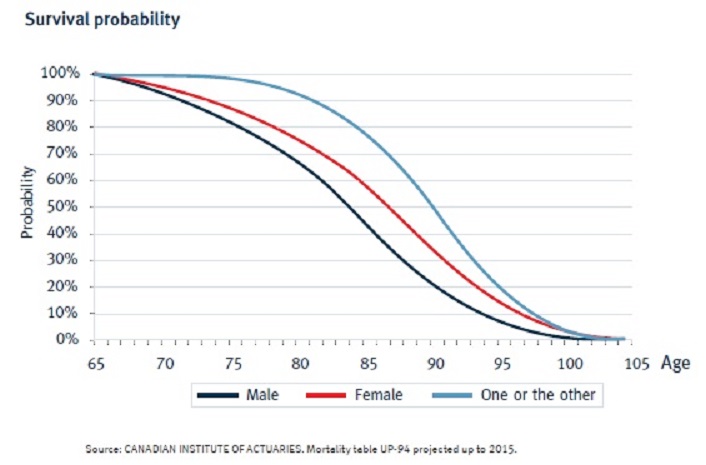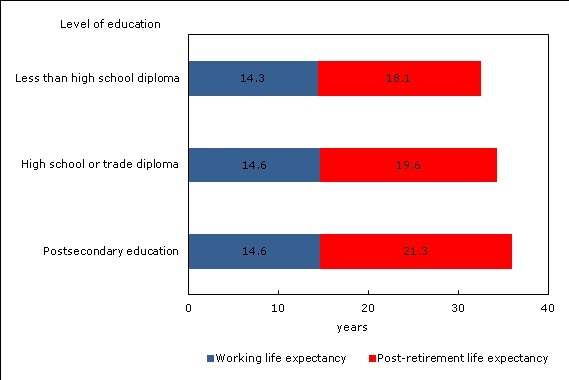Retirement Stats, Studies, and Stuff
By Mariella Vigneux, MBA, ACC
Certified Professional Coach
I just heard about a seemingly healthy police officer who died two years after retiring. Not long ago I was told of a long-distance truck driver who died the day after he retired. We’ve all heard such tales. Can retirement lead to sudden death? I believe this rarely happens, that it’s a myth perpetuated by personal anecdote and love of a riveting story.
It used to be true – people died upon retirement
Back in 1921, people worked until they died. According to Statistics Canada, almost 60% of men age 65 years or older were in the labour force; their average lifespan was about 59 years. No wonder it looked like people died upon retirement. They did!
Contradictory studies
Do we live longer if we retire early or are we more likely to die younger? The studies present varying results.
In an article titled Can Retirement Kill You?, three studies showed contradictory evidence:
…there is some evidence to suggest that retirement can have an impact on mortality independent of preexisting conditions. A study of former Shell Oil workers published in 2005 contradicted the popular myth that early retirement leads to a longer, happier life. Looking at thousands of employees who retired from the company between 1973 and 2003, it found that those who retired at 55 died younger, on average, than those who retired at 65. The effect held even for those who retired at 55 but were still alive at 65, making it somewhat less likely that they retired early because of failing health. Likewise, a study of more than 16,000 Greeks published in 2007 found that retirees were 51 percent more likely to die during the follow-up period than employed people of the same age. It excluded those who had been previously diagnosed with serious illnesses. On the other hand, an even larger German study from 2009 controlled for the number of days workers had spent in the hospital in the two years prior to retirement, and found that among the healthier participants in the study, those who retired early actually lived longer.
One large study of blue-collar workers found that early retirement can increase the risk of premature death for males:
We find that a reduction in the retirement age causes a significant increase in the risk of premature death – defined as death before age 67 – for males but not for females. The effect for males is not only statistically significant but also quantitatively important. According to our estimates, one additional year of early retirement causes an increase in the risk of premature death of 2.4 percentage points (a relative increase of about 13.4%; or 1.8 months in terms of years of life lost).
….Our results also indicate that the causal effect of early retirement on mortality for females is zero….
However, a large German study of 88,399 men and 41,276 women concluded the healthy people who retire early have the same survival rate as healthy people who retire later.
Let’s look at the Canadian facts – we live long past retirement
With better health care, education, working conditions, and social supports, life is now much longer than it was in 1921, and we can expect our retirements to last much longer than those poor suckers of the 1921 era.
Statistics Canada says men can expect to be retired for about 15 years before dying; women can anticipate 19 retirement years prior to death.
Between 1921 and 2012, average life expectancy at birth rose substantially in Canada, from 59 to 80 years for males and from 61 to 84 years for females.
According to Statistics Canada, the average retirement age has risen steadily since 2009, reaching 62.3 years in 2011, after hovering at 61.5 for about a decade.
Some are predicting retirements lasting up to 40 years
According to The Canadian Institute of Actuaries Mortality Table, our retirements might last as long as 40 years.
With the remarkable advances in modern medicine, combined with the fact that more and more Canadians are paying closer attention to their health (better eating, sleeping and exercise habits), the average life expectancy should continue to reach new heights. In other words, we are no longer talking about a 10 or 15-year retirement, but one that may even last as long as 40 years! The following chart illustrates this probability.
An interesting point – if you are currently 65 years of age, you or your spouse has a 50% chance of reaching the age of 90.
Four factors that can shorten post-retirement life
With all this good news about our increased lifespan and increased retirement years comes a few limiting factors that can shorten life in post-retirement. Some factors we have influence over and others we don’t. Here are four such factors:
1. Involuntary retirement
2. An unhealthy lifestyle
3. Less education
4. Broken-heart syndrome
1. Involuntary retirement can cause excess negative health effects
The study of blue-collar workers that I mentioned above stated the following:
“Our empirical results suggest that retirement following an involuntary job loss is likely to cause excess mortality among blue-collar males, while retirement after a voluntary quit does not.”
A study of involuntary job loss concluded that older workers who involuntarily lost their jobs had
…poorer physical functioning and mental health
2. An unhealthy lifestyle after retirement is a risk
In the case of the police officer I mentioned who died two years after retiring, he sat on the couch watching television for those two years and then died of a stroke.
As stated in Can Retirement Kill You?:
While some retirees live active, healthy lives, peppering their days with tennis matches and volunteer work, others languish in front of the television. The everyday routine of getting up, going to work, interacting with colleagues, and striving for professional goals can keep people more physically and mentally fit than a quiet yet dull retirement. (Continuing to make money also doesn’t hurt.)
The study of blue-collar workers suggested that changes in health-related behaviours associated with smoking, drinking, an unhealthy diet, and little physical exercise were the cause of premature death following early retirement by men. The study said that
“…women may be more health-conscious and adopt less unhealthy behaviours than men; they may be more active after permanently exiting the labour market due to their higher involvement in household activities.
3. Less education can mean a shorter post-retirement life expectancy
Statistics Canada has shown that if we have a lower level of education our post-retirement life expectancy will be shorter.
4. Broken-heart syndrome can cause sudden death
It is possible to die unexpectedly as a result of sudden loss or sudden great happiness. The condition is known as Takotsubo cardiomyopathy, sometimes referred to as broken-heart syndrome.
The mysterious malady mimics heart attacks, but appears to have little connection with coronary artery disease. Instead, it is typically triggered by acute emotion or physical trauma that releases a surge of adrenaline that overwhelms the heart.
The syndrome is relatively uncommon, accounting for an estimated 1% to 2% of people – and about 6% of women – who are diagnosed with a heart attack. In addition to such common emotions as grief and anger, doctors say broken-heart syndrome has been triggered by a person’s anxiety over making a speech, a migraine headache or the emotional response to a surprise party. It can be fatal on occasion, but for the most part patients recover quickly, with no lasting damage to their hearts.
Happy retirement!
The good news is that we’re not dying as soon as we retire. The shock of sudden retirement rarely kills. Most people will have a good 15 to 40 years of retirement. We’re living longer and more comfortably. Our health care, education, and support systems have improved immensely over the years. We don’t need to worry about those stories we hear about people dropping dead upon retiring.
Self-Coaching Questions
If you haven’t yet retired, what can you do to control the timing and conditions of your retirement? How can you make your retirement voluntary, instead of involuntary?
If you have retired, what can you do to improve your lifestyle (eating habits, finding something you love to do, activity level, stress level, social connectivity, mental engagement, etc.)?




I am a healthy 80 year old who refuses to retire and I firmly believe that I will continue to live to a ripe old age because we were born to work and use our bodies to stay healthy.
Clarence, it’s great to hear your take on it! And it’s obviously working for you. Thank you for commenting.
Retired from the US Army after 20yrs in the Corrections Field (1973-93) and have worked for the USPS since that retirement (1993-Present). I turn 62yrs old in March and am looking forward to my 2nd retirement in April 2017. Although I am quite healthy and could possibly “go the distance”, I have chosen now as opposed to waiting until “the wheels fall off”. Tired of being scheduled..which we all have been since birth. I’ve seen too many stay too long (into their 70’s) only to pass away soon after. More to life than toil.
More to life than toil, for sure! Stephen, you have certainly put in your time in service. It sounds like you’re more than ready to live unscheduled, free to pursue your own whims and wishes. It was great to hear your wisdom. Good luck with retirement – in APRIL!
My recently retired brother, age 66, has been telling me, his only sister and sibling not to retire completely for a while yet. As of April 19, I realized that my then current ‘partial retirement’ wouldn’t work for me. I’ve worked for 30 plus years as a Certified Nursing Assistant and although I’ve loved it for the most part, it has wrecked my body. My brother thinks I’ll die soon now that I’m completely retired. My physical health isn’t the best, with arthritis, joint pain and on and on. But! I have a positive outlook. I love doing projects around my apartment, spoiling my 2 cats and talking to people out in the community. I basically had no choice. ‘That day’, on April 19, was the day my body
let me know I needed to slow down and stop the toll on my body. Keep a positive attitude and enjoy what life has to offer every single day. None of us really know when we’ll cross over. If I dwell on it, I won’t truly be living!
Pat, listening to your body makes so much sense. Not everyone is as attuned as you; perhaps it comes from working in health care. By retiring fully, it sounds like you’ll make the most of the joys that come your way. And, after 30 years of work, why not play — while your body is willing and able. I like your positive spirit and life philosophy. Have fun!